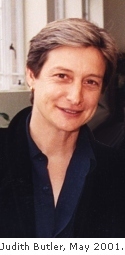
U lucidnom i važnom osvrtu na slavan tekst Mišela Fukoa „Šta je kritika?" Džudit Batler odgovara istoimenim tekstom „oplemenjujući" Fukoovu ideju uvođenjem motiva Teodora Adorna pre svih, čime sledi Fukoove upute da se njegova teorija umnogome poklapa sa pojmovnim izumima Frankfurtske škole. „Kritika će biti umeće voljnog neropstva, umeće promišljene neposlušnosti. Suštinska funkcija kritike bila bi desubjektivacija u igri onog što bi se najsažetije moglo nazvati politikom istine.“ Michel Foucault „Politika istine tiče se onih odnosa moći koji unapred definišu šta će se računati kao istina. Značaj ove tvrdnje shvatamo kada počnemo da se pitamo: šta se računa kao osoba? Šta se računa kao koherentni rod? Šta se računa kao građanin? Čiji se svet legitimiše kao realan? “ Judith Butler
Authors

Michel Foucault was a French philosopher, social theorist and historian of ideas. He held a chair at the Collège de France with the title "History of Systems of Thought," but before he was Professor at University of Tunis, Tunisia, and then Professor at University Paris VIII. He lectured at several different Universities over the world as at the University at Buffalo, the University of California, Berkeley and University of São Paulo, University of Rio de Janeiro, Brazil. Foucault is best known for his critical studies of social institutions, most notably psychiatry, medicine, the human sciences and the prison system, as well as for his work on the history of human sexuality. His writings on power, knowledge, and discourse have been widely influential in academic circles. In the 1960s Foucault was associated with structuralism, a movement from which he distanced himself. Foucault also rejected the poststructuralist and postmodernist labels later attributed to him, preferring to classify his thought as a critical history of modernity rooted in Immanuel Kant. Foucault's project was particularly influenced by Nietzsche, his "genealogy of knowledge" being a direct allusion to Nietzsche's "genealogy of morality". In a late interview he definitively stated: "I am a Nietzschean." Foucault was listed as the most cited scholar in the humanities in 2007 by the ISI Web of Science.

Judith Butler is an American post-structuralist and feminist philosopher who has contributed to the fields of feminism, queer theory, political philosophy and ethics. They are currently a professor in the Rhetoric and Comparative Literature departments at the University of California, Berkeley. Butler received their Ph.D. in philosophy from Yale University in 1984, for a dissertation subsequently published as Subjects of Desire: Hegelian Reflections in Twentieth-Century France. In the late-1980s they held several teaching and research appointments, and were involved in "post-structuralist" efforts within Western feminist theory to question the "presuppositional terms" of feminism. Their research ranges from literary theory, modern philosophical fiction, feminist and sexuality studies, to 19th- and 20th-century European literature and philosophy, Kafka and loss, and mourning and war. Their most recent work focuses on Jewish philosophy and exploring pre- and post-Zionist criticisms of state violence.